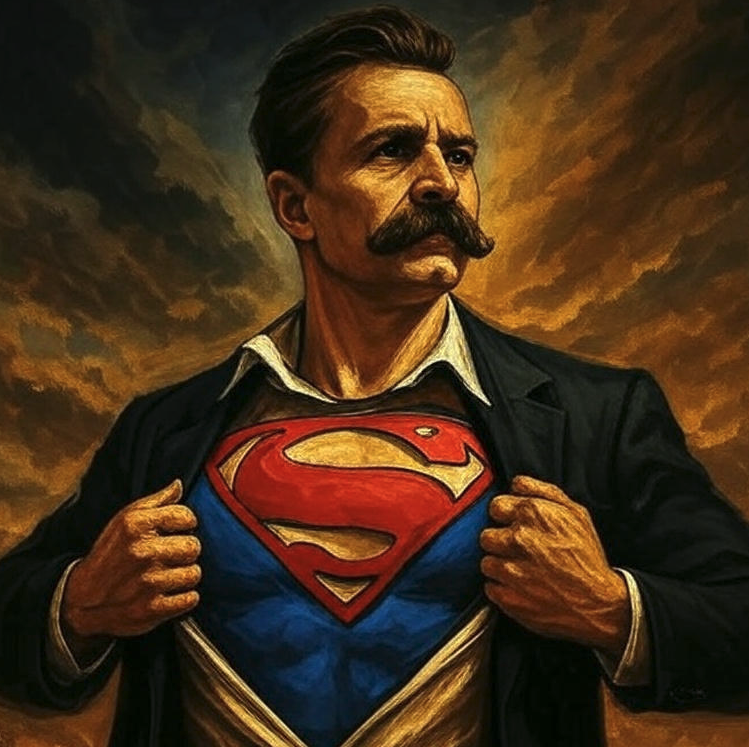
Somewhere between a 19th-century German philosopher scribbling about Übermenschen and a caped alien saving cats in Metropolis, we lost the plot.
We took Nietzsche’s Sovereign Individual, dressed him in blue spandex, slapped an “S” on his chest, and called it a day.
But here’s the kicker: Nietzsche wasn’t writing comic books.
He was describing a terrifying, beautiful possibility — a human who masters himself, unplugs from herd morality, and creates values from nothing but will.
The Sovereign Individual — both Nietzsche’s and the one in the cyber-financial prophecy of the 1997 book — is not invincible.
In fact, just like Superman, he has Kryptonite.
Let’s dig in.
Nietzsche’s Sovereign Individual: Master of His Fate, Lord of His Contracts
In On the Genealogy of Morality, Nietzsche paints the Sovereign Individual not as a rebel, but as someone who no longer needs to rebel.
He doesn’t obey because he doesn’t need to — not because he’s bitter, but because he’s transcended.
“To breed an animal that is permitted to promise…” — Nietzsche
Translation:
A being who is so self-controlled, so internally ordered, that he can give his word and mean it — without police, laws, or gods watching over him.
Sound familiar?
Sounds a lot like the sovereign individual of the 21st century:
- No central bank
- No nanny state
- No permission slips
- Just responsibility, ownership, and unshakable autonomy
The 1997 Vision: The Digital Übermensch Arrives
Fast forward 100 years.
Two economists write The Sovereign Individual, predicting the collapse of nation-states, the rise of cyber economies, and the birth of digital elites who outgrow the tax farms.
Sound radical?
It aged like fine whiskey.
Their Sovereign Individual isn’t born in a Nietzschean thunderstorm.
He’s minted in bytes:
- Borderless
- Self-employed
- Financially invisible
- Politically indifferent
- Morally independent
He doesn’t storm the palace.
He ignores it.
He doesn’t seek power.
He seeks exit.
He’s not Superman.
He’s cryptographic, decentralized, self-custodied man.
Superman: Übermensch or Cartoon Version?
Nietzsche’s Übermensch is meant to inspire dread and awe — a creator of values, a force beyond good and evil.
DC Comics’ Superman is… well, a sweet farm boy with laser eyes.
Yes, the idea of a superhuman who transcends normal limits was clearly inspired by Nietzsche.
But the result was declawed for public consumption.
Superman fights for “truth, justice, and the American way.”
Nietzsche’s sovereign individual would probably vomit at all three — then rewrite the rules.
The Kryptonite: What Weakens the Sovereign Individual?
Now here’s where it gets uncomfortable.
Because even the Sovereign Individual has a weakness.
It’s not green crystals.
It’s not evil villains.
It’s not the NSA.
It’s far worse:
Emotional reattachment to the very systems he escaped.
Like Superman who still wants to save Lois Lane,
the sovereign individual may secretly crave:
- Approval from the masses he outgrew
- Meaning from the systems he rejected
- Comfort from the institutions he no longer trusts
And just like Kryptonite, this weakness is self-inflicted.
It’s the longing to be understood by a world designed to misunderstand him.
The need to “do good” in a collapsing system instead of just building a better one.
Conclusion: Your Power Ends Where Your Attachment Begins
Nietzsche’s Sovereign Individual didn’t ask for validation.
The digital one shouldn’t either.
You don’t need permission to build sovereignty.
But you do need to give up the fantasy that the old world will clap for you when you leave it.
Kryptonite isn’t external.
It’s nostalgia.
And the only thing stronger than Superman’s punch is the man who walks away from needing to be Superman at all.